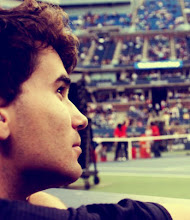Today I'll continue my little series on memories I had with the Young Ambassadors, based on our presentations on the cube. I started out with Elise last week and talked about the secret of becoming a champion. Today I wanted to write about a memory with the next one in line, which happens to be...me! Well, that's tricky. Call me self-absorbed, but I'm still going to write a little about myself since I happen to have some memories involving me as well. Besides, yesterday was my birthday, which for me is always a time of reflection (and of course partying), so that might fit rather well.
When I went to S
"I can't describe it. It's just that I feel that I must have done something right in life, since it has led me to this very moment."
On the last day in Singapore, I was chosen to say a few words of thank you to some people. I was really nervous before, being given the fact that I had to give a speech for some hundred people in two languages I'm not a native in. Shortly before it was time, I talked to Gan Su-Lin, who gave an excellent presentation on cultural differences (check out Erin's latest blog on that!!). We were talking and she gave me some encouragement. Before I left to deliver my speech, I thanked her and said: "You know, I'm just a little insecure, because I'm still in development." She just smiled at me and replied: "We all are!"
 I know I'm using this phrase quite a bit, but yeah: This is what it's all about! We are all in a constant state of flux (if you know from which song this quote comes, I owe you an ice kachang :)). However, since we are all in the same boat, there will always be somebody to assist us in our development. And just as I had the great help of Gan Su-Lin, I'll try to help the young athletes in Singapore with their development as well. So if you are an athlete going to Singapore, just look for the nice Austrian with the funny poses ;)
I know I'm using this phrase quite a bit, but yeah: This is what it's all about! We are all in a constant state of flux (if you know from which song this quote comes, I owe you an ice kachang :)). However, since we are all in the same boat, there will always be somebody to assist us in our development. And just as I had the great help of Gan Su-Lin, I'll try to help the young athletes in Singapore with their development as well. So if you are an athlete going to Singapore, just look for the nice Austrian with the funny poses ;)
 I know I'm using this phrase quite a bit, but yeah: This is what it's all about! We are all in a constant state of flux (if you know from which song this quote comes, I owe you an ice kachang :)). However, since we are all in the same boat, there will always be somebody to assist us in our development. And just as I had the great help of Gan Su-Lin, I'll try to help the young athletes in Singapore with their development as well. So if you are an athlete going to Singapore, just look for the nice Austrian with the funny poses ;)
I know I'm using this phrase quite a bit, but yeah: This is what it's all about! We are all in a constant state of flux (if you know from which song this quote comes, I owe you an ice kachang :)). However, since we are all in the same boat, there will always be somebody to assist us in our development. And just as I had the great help of Gan Su-Lin, I'll try to help the young athletes in Singapore with their development as well. So if you are an athlete going to Singapore, just look for the nice Austrian with the funny poses ;)



























